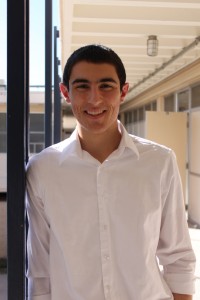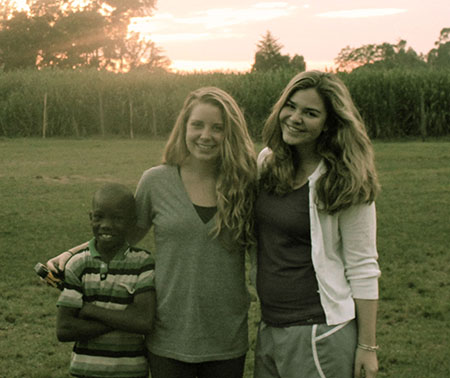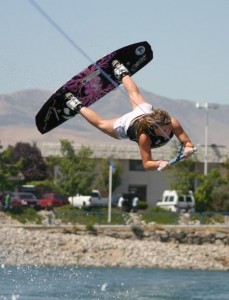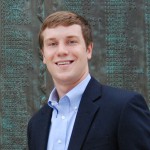 BHP freshman, George Chidiac, made his way to Austin from El Paso. As one of only a small group of El Paso students to come to McCombs, he has had to make new friends here. BHP has been a great place for him to make friends and UT and McCombs have allowed him to learn about and explore new areas of interest. We sat down with him to find out more about what his first year here has been like.
BHP freshman, George Chidiac, made his way to Austin from El Paso. As one of only a small group of El Paso students to come to McCombs, he has had to make new friends here. BHP has been a great place for him to make friends and UT and McCombs have allowed him to learn about and explore new areas of interest. We sat down with him to find out more about what his first year here has been like.
Why did you decide that the BHP was right for you?
I knew I wanted to do business wherever I went to school and I really wanted to live in Austin. BHP has a very strong reputation, so that was a big selling point for me. I made my decision during Discover BHP. When professor Prentice spoke to us about the program, particularly about the quality of the professors, it really sold me on the program. The student culture here is very supportive and very laid back; students know their peers are good and it turns into a collaborative effort to succeed, rather than being cutthroat.
What has been most surprising about the BHP so far?
There is so much about BHP that I didn’t know. The access to all the resources is amazing. People want to help you and they go out of their way for you. For example, I want to go the entrepreneurial route, and have been able to have discussions with the current McCombs Entrepreneur in Residence about what I would like to. I also have John Butler for a class, who has started many companies and has extensive experience in entrepreneurship. They are helping me find an internship and are also teaching me about starting my own business. Also the upperclassmen in BHP really mean it when they say they want to help you. They have recommended classes and professors to me, which has been really helpful.
What has been your favorite class this year?
I would have to say my class with John Butler. It is called Innovation and Entrepreneurship. Being an entrepreneur is like being a pilot. You don’t just jump into a plane and start flying; it’s all about educating yourself beforehand. This class is teaching me about everything and why it works and why it doesn’t. That is giving me the tools to take my own ideas and test them. Dr. Butler is also very funny and super confident. He really knows his stuff and it is very reassuring to know that you are being taught by someone who is so knowledgeable. The books I have for many of my classes this year were actually written by the professors teaching me, so I know they are experts and that is really great.
What organizations and activities are you involved in?
I am involved in HBA, Young Life, BHP Steering Committee, and am pledging a fraternity. HBA does an event called “Dinner With a Professor,” and through that event, I was able to meet the professor I will have this summer when I take part in the BHP study abroad opportunity in Argentina. The social events for HBA involve all the classes, so I get to meet other BHP students outside of my class. I came here not really knowing anyone and it has been nice to have support from people in BHP and the other organizations I am involved in.
What do you like to do for fun in Austin?
I love dancing. I didn’t go dancing before I came here. A group of friends were going country dancing to Midnight Rodeo and I went with them and really loved it. I am hooked now and am actually taking a social dance class, which is a mix of all styles of dance; two-step, tango, east-coast and west-coast swing. It has helped me get out of my comfort zone.
As a freshman in the program, you were assigned a peer mentor. Was that relationship valuable to you?
Ben Rogers is my peer mentor and he has been great. He has taken me to restaurants around Austin for fun. We became good friends. He showed me around Austin and has always been there to answer any questions that came up for me. It was nice to know that I had access to someone who has done it already. He has been a peer mentor for several classes of BHP students, so it has also helped me bond with other students who had him as a peer mentor as well.
How do you think the funds from BHP alumnus, Woody Hunt’s, El Paso scholarships will affect students in the West Texas region?
The gift he made isn’t just important because of the money. It is actually bringing a much needed emphasis on UT to the region. A lot of the really gifted kids in El Paso leave and never come back, or they just aren’t challenging themselves like they need to. I think that if more El Paso students came to UT, they would be more likely to stay in-state and maybe go back to El Paso after graduation. The Hunt gift will be able to take money off the table of factors being considered when students are deciding. A lot of students are deterred by the costs since other schools are offering them scholarships. With a scholarship to BHP, they can really consider their options. This is a statement to students showing that we are going to reward those who are working hard, so work hard and challenge yourself. I wouldn’t have been able to come to UT if it weren’t for people who supported me both financially and personally. Help goes a long way and I think his help in the form of scholarships could be quite far reaching.





